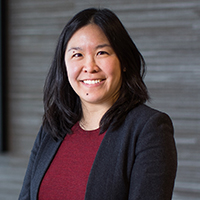 The industry event anyone in secured finance attends now celebrates its 77th year. SFNet is set to make the Arizona convention a memorable one. Click below to register.
The industry event anyone in secured finance attends now celebrates its 77th year. SFNet is set to make the Arizona convention a memorable one. Click below to register.

Ying Hsu
Partner, McGuireWoods LLP
Ying Hsu is a partner in McGuireWoods LLP’s debt finance group in Chicago. She is co-chair of the Women Lawyers Network of the firm’s Chicago office, as well as the chair of the Chicago office’s recruiting committee.
Ying concentrates her practice in middle-market finance transactions, focusing on asset-based lending, fund finance, and leveraged acquisitions. Her experience includes senior secured, cash flow and asset- based facilities, second lien and mezzanine debt, working capital lines and dividend recapitalizations. Ying has worked on transactions across a broad variety of industries but has focused on structuring, negotiating and documenting credit facilities in the healthcare sector.
Outside of the office, Ying has been heavily involved with the Apollo Chorus of Chicago, serving on its board of directors for a number of years and providing pro bono legal services. She is also a member of the President’s Leadership Council, an auxiliary board of The Field Museum, and serves on the board of The Catalyst Schools. Ying earned her law degree from New York University School of Law and her undergraduate degree from Yale College.
What do you know now that you wish you knew in the beginning of your career
Our careers are marathons, not sprints, and the paths we take may deviate over time. As a law student, I had the goal of being a partner at a law firm, without having a good idea of what that really meant on a personal or professional level. Over the years, I spent a lot of time thinking about how to balance career goals with personal goals. It took me a long time (probably longer than it should have!) to realize that each phase of my career and my life would require adjustments and, more importantly, to accept that my career might not look like my friends’ and colleagues’ careers. It’s a long haul, and we each have to define what a “successful career” means to us individually.
It is also never too early to start building your network. As an associate, I found it easy to stay at my desk and bill my hours, but that also meant that I didn’t always take the time to prioritize relationships with friends, colleagues, and professional contacts. In the long run, it’s not just our skills that matter, but our relationships as well.
What role has mentoring played in your career?
Having great mentors has been key to my staying in the practice of law. As a young associate, feeling overwhelmed by the hours and the stress, it was important for me to see how more seasoned attorneys approached their practices. As I became a wife and mother, it was invaluable for me to see other working moms with kids managed their legal careers and family schedules. Not all of my mentors were “formal” mentors – but having the ability to look to more senior attorneys and see how they approached their practices was incredibly helpful in my own career path.
Now, as a partner, I prioritize time to mentor law students and young associates at our firm. I was the beneficiary of such great wisdom from my mentors over the years, and I think it’s important for me to pay it forward for the next generation of lawyers. I have big shoes to fill, but I hope my advice and support are helpful!
How do you balance work/personal time?
Like many professionals in client service, I feel like this is the million-dollar question! I have always taken the position that it is unrealistic for me to balance my work life and my personal life on a daily basis and that it is best to strive for a reasonable balance over a longer-term period. I try to reserve time in the early mornings and evenings for my family, but I also found that being too rigid with my schedule didn’t always work well for me. Now, I try to approach my schedule with a more flexible outlook. Some days might be more work-focused, especially at a quarter-end, while some days might be family-focused. It is an ongoing juggle, but an important one, especially now in our current work-from-home environment. It is easy for our normal work/life boundaries to be lost in the shuffle right now, making it all the more important to prioritize that balance.
77th Annual Convention
 The industry event anyone in secured finance attends now celebrates its 77th year. SFNet is set to make the Arizona convention a memorable one. Click below to register.
The industry event anyone in secured finance attends now celebrates its 77th year. SFNet is set to make the Arizona convention a memorable one. Click below to register.
